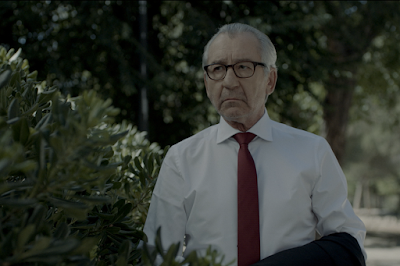No less a filmmaker than Pedro Almodóvar has this to say about the movie being covered today: "For me, the film is the great Spanish cinema revelation of the century." Now, who's gonna pass that up? Not me, baby! Having now watched MAGICAL GIRL (La niña de fuego--a literal translation of which might be "The fire girl," or maybe "The hot girl"), I can honestly say that I will probably never quite forget this film, even though there's a hole in it a mile wide -- a piece missing that is not unlike the puzzle piece needed to complete a jigsaw that one of its characters finds himself suddenly without. And yes, this is as frustrating to us viewers as it is to that very strange character named Damián, a schoolteacher whose interaction with his pretty student foreshadows much that is to come, particularly the film's finale.
In between all this, the meat and potatoes of Magical Girl, written and directed by Carlos Vermut (shown at right), is devoted to that schoolgirl's later story as an adult, as well as the tale of a father (also a schoolteacher who is now unemployed) and his very ill daughter, whose last days he wants to make as pleasurable as possible, and, of course, that of Damián, who proves to be the film's wild card. The interlocking stories, strange as they are, seem perfectly easy to follow, including how and why they connect. Yet certain events have been left out that would explain some rather important information about these "connections." Without this, we can still play along, as it were -- and because the film is so fascinating and creepy and unsettling, we do -- but at the end, there remains a void where more content and/or explanation ought to be.
But that may be the director's main point: his own way of struggling with the eternal problem nature of the Spaniard, as one of the film's subsidiary characters -- a rich wheelchair-bound fellow who likes to inflict torture for payment -- explains to us and our heroine along the way. Don't worry: All of that torture is left offscreen. But sight of the the naked body of the film's title girl, played with exactly the right amount of inner strength and outer madness by Bárbara Lennie (above, left, and below, right), makes what has and what will happen perfectly clear.
Still, this wheel-chair fellow's insistence on the "bullfight" as a symbol of Spain should go some distance in letting us know what's important here. How people treat each other is always front and center. Why they do this is something else again.
Vermut's style is one of quiet and foreboding, mystery without conclusion, and he has chosen a cast that near-perfectly complements his aim. You simply cannot help asking yourself, post-viewing, what all of it means, but your answer(s) -- a search for justice, connection, closure; payment for past sins; balancing out the country's national character with some death and destruction -- will not really fill the bill.
There's that piece that's gone missing, I guess, and we're never going to be able to find it. Yet the elegance of the filmmaking, along with the excellence and correctness of the performances will go along way in making the movie slide down your throat smoothly. I can understand why our boy Pedro was so impressed.
As the father and daughter, who in the course of the film go from would-be heroes to mere pawns (and not-very-nice ones, at that), Luis Bermejo (below, right) and Lucía Pollán (above) could hardly be better. And Ms Lennie is, as usual, something else.
But it's José Sacristán (above, left, and below), as that wild card, who eventually steals the movie. And also, through no fault of his own, leaves it twisting in the wind. But that, I suspect, is exactly as the filmmaker wants it to be.
Magical Girl, running a lengthy but never boring 122 minutes, is one of the rare narrative movies released via First Run Features (they're rare, yes, but they're almost always worth seeing). The film hits DVD today, Tuesday, April 19, for rental or purchase.












No comments:
Post a Comment